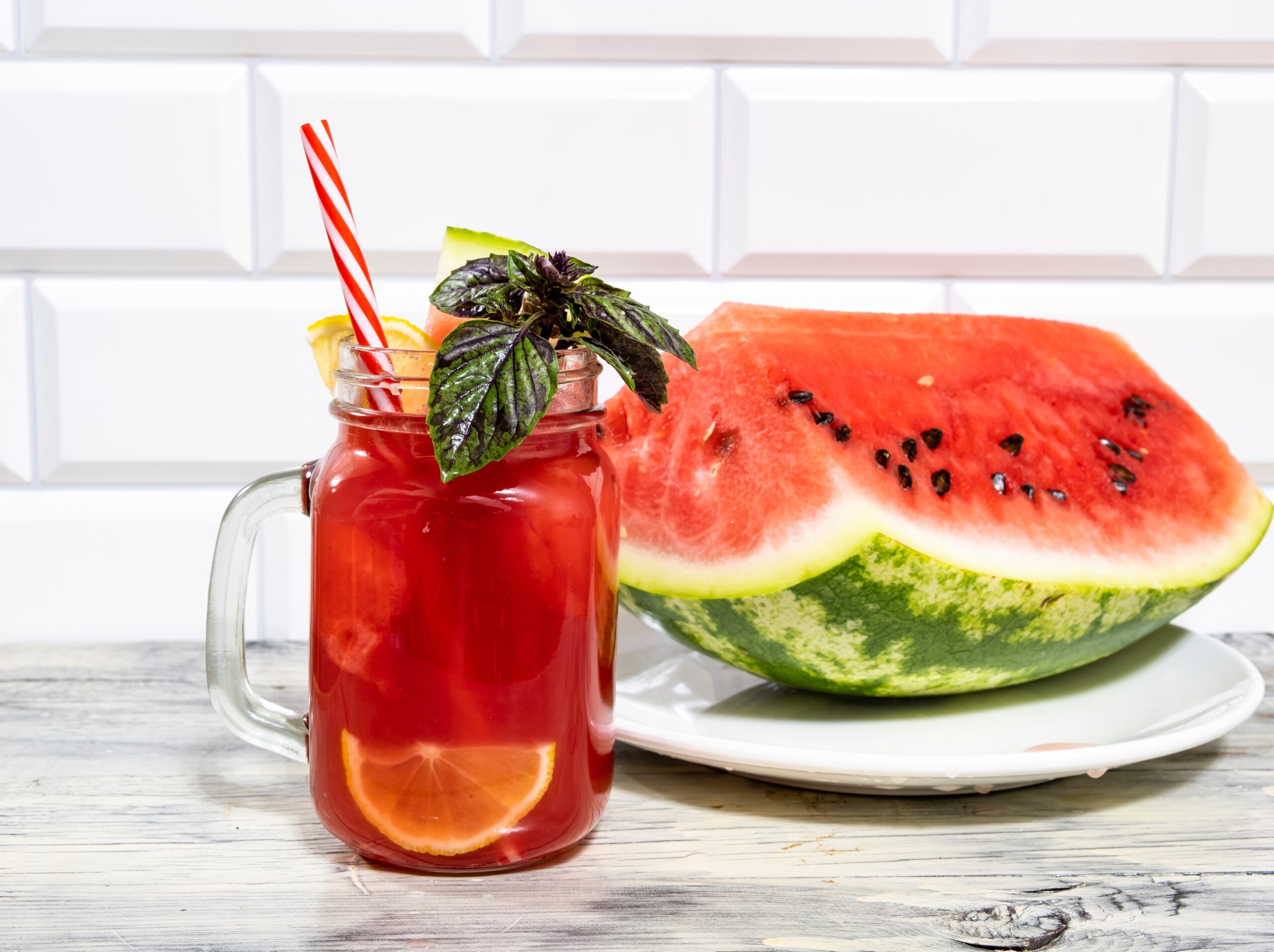
Melon – a delicious, hydrating and cooling fruit for the summer. Melon is not a food that plays well with others, so it is best to drink this Mint Melon Cooler at least two hours before a meal.
We started this cooling, refreshing drink with a handful of mint because mint calms the stomach! It is packed with antioxidants and phytonutrients that do wonders for your stomach. The menthol present in mint helps the enzymes necessary for digestion and helps the process along, by acting on the smooth muscles of the stomach. The aroma of mint activates the salivary glands and the glands that produce digestive enzymes. As a result, our digestion becomes better.
A refreshing mint scent is a powerful medicine to treat nausea. Smelling the mint oil or fresh mint leaves relieves or reduces nausea. Mint has a very strong aroma which helps open up the airways and allows relaxed breathing. It is also an expectorant and helps get rid of congestion so you can can beat any summer cold faster. Its antibacterial and anti-inflammatory properties help relieve inflammation along the respiratory tract. The use of mint on a regular basis can help people with asthma because it can provide relaxation and help relieve tightened airways which is a Vata problem.
Mint being pitta pacifying, soothes and calms itchy and infected skin. It has potent anti- inflammatory and antibacterial properties which do wonders for acne prone skin. The strong antioxidants present in mint leaves the skin with a natural glow and rehydrates dull and dry skin. Mint has a high content of salicylic acid which helps prevent pimples, blemishes and even helps get rid of blackheads. The compounds present in mint help in faster shedding of dull and dry skin. This helps avoid clogging of pores, resulting in pimple free skin.
We added just a little ginger as ginger is moist and dry at the same time and is known as a universal medicine benefitting everybody and all diseases. Especially good for Vata disorders, this is one of Ayurveda’s best go-to spices. When using ginger, think digestion, lungs and circulation. All Vata problems.
Ginger with its pungent and sweet taste warms the digestive system, increases digestive fire (agni) and helps in the secretion of digestive enzymes. Also useful in nausea, especially travel-sickness, gas bloating and stomach gripping – it has a specific action against E. Coli and Shigella bacteria.
Ginger is great when used in menstrual cramps as it regulates Vata in the lower abdomen. Despite its warm energy, it also is an anti-inflammatory. It has the properties of being able to warm and cool and is really beneficial at nourishing the reproductive system.
Ginger has a unique effect (prabhava). It’s post-digestive quality is sweet which means its long term effect is anti-inflammatory and nourishing while its initial effect is warm and stimulating for the digestion. That’s good news for anyone that has digestive and inflammatory problems.
And lastly – we added lots of watermelon. Watermelon is a quintessential summer fruit. It invites children and adults alike to step out of the heat and enjoy a refreshingly cool treat on a summer day! This delightful, rosy pink fruit cools the body and restores balance to overheated blood.
High in beta-carotene, watermelon substantially balances the blood and reduces Pitta justifying its prominence as a summertime fruit. As beta-carotene in carrots “brightens the eye”, 1½ servings of watermelon daily has been shown to reduce age related macular degeneration by 36%. A biteful or two will convince you of watermelon’s eye-relaxing abilities. Watermelon contains copious amounts of the antioxidants lycopene and vitamin C.
Watermelon is 92% water and 6% sugar. Although the large fruit might be a tempting way to relieve dehydration, watermelon’s juiciness only quenches thirst temporarily. Those who suffer from water retention will be happy to hear that, ultimately, watermelon dries the body because of high levels of potassium, a diuretic.
The cooling, anti-inflammatory effects of beta-carotene, combined with diuresis help watermelon flush inflammation from the urinary tract. Its low calorie count, drying quality and ability to reduce insulin resistance are ideal for Kaphas.
To receive the health benefits of watermelon, it is important to know how to eat it. Melons digest very quickly and should never be combined with other foods, and that is because heavier, more difficult to digest foods prevent watermelon from traveling its normal high speeds through the digestive tract. This congestion in the GI tract allows bacteria to attack the watermelon and ferment it, releasing gas.
So eating watermelon at the end of a summer cook-out is a bad idea. Try eating it while the veggies are still on the grill, as a snack between meals, or as we have shown you here as a cooling drink in the morning or afternoon.
Mint leaves are packed with nutrients such as calcium, phosphorous, vitamin C, D, E and small amounts of vitamin B complex. All these compounds put together improve your body’s immune system, providing resistance for infections and inflammation.
Mint has a potent phytochemical that can prevent various types of cancers. Called perillyl alcohol, the phytonutrient has shown the capability of preventing skin cancer, colon cancer and lung cancer in animal studies.
Aside from all the other health benefits of mint, it also can help in your efforts to lose weight in a healthy way! Mint is a stimulant, and stimulates the digestive system to help absorb nutrients from food and consume fat and turn it into usable energy. Therefore, by adding mint to your diet, you are increasing the amount of fat that is being consumed and put to use, rather than being stored and contributing to your weight gain!
The potassium contents present in the mint leaves help to lower blood pressure and also regulate your pulse rate. According to the University of Maryland Medical Center, consuming mint regularly may help to lower your blood pressure.
Ginger gives us Gingerol, a substance with powerful medicinal properties. It has been used to help digestion, reduce nausea and help fight the flu and common cold, to name a few.
Ginger appears to be highly effective against nausea. relieving nausea and vomiting after surgery, and in cancer patients undergoing chemotherapy .But it may be the most effective when it comes to pregnancy-related nausea, such as morning sickness.
Ginger has been shown to be effective against exercise-induced muscle pain. In one study, consuming 2 grams of ginger per day, for 11 days, significantly reduced muscle pain in people performing elbow exercises. Ginger does not have an immediate impact, but may be effective at reducing the day-to-day progression of muscle pain. These effects are believed to be mediated by the anti-inflammatory properties.
Osteoarthritis is a common health problem that involves degeneration of the joints in the body, leading to symptoms like joint pain and stiffness. Interestingly in a controlled trial of 247 people with osteoarthritis of the knee, those who took ginger extract had less pain and required less pain medication. Another study found that a combination of ginger, cinnamon and sesame oil, can reduce pain and stiffness in osteoarthritis patients when applied topically.
Just to note this remedy is often given as an ayurvedic remedy for Vata type arthritis.
Watermelons are mostly water — about 92 percent — but this refreshing fruit is soaked with nutrients. Each juicy bite has significant levels of vitamins A, B6 and C, lots of lyc
opene, antioxidants and amino acids. There’s even a modest amount of potassium. Plus, this quintessential summer snack is fat-free, very low in sodium and has only 40 calories per cup.
Foods that are high in antioxidants and amino acids allow your body to function optimally. Antioxidants help prevent damage, and cancer.
Scientists have taken notice of watermelon’s high lycopene levels — about 15 to 20 milligrams per 2-cup serving, according to the National Watermelon Promotion Board — some of the highest levels of any type of fresh produce. Lycopene is a phytonutrient, which is a naturally occurring compound in fruits and vegetables that reacts with the human body to trigger healthy reactions.
Lycopene has been linked with heart health, bone health and prostate cancer prevention. It’s also a powerful antioxidant thought to have anti-inflammatory properties.
Watermelon also contains Citrulline, an amino acid in the rind and flesh of the watermelon. It has similar properties to Viagra in the fact they both stimulate nitric oxide which relaxes and expands blood vessels, lowering blood pressure and enhancing blood flow (and thus erectile performance). In fact, watermelon seeds are a symbol of fertility in Chinese weddings.
4 cups watermelon, deseeded and chopped
1/2 cup fresh mint leaves
1/4 teaspoon ginger powder
1 lime, juiced
1/2 cup coconut water
Mint leaves for garnish
Place the melon, mint leaves and ginger powder along with the lime juice in a blender. Add the water and blend on high till smooth.
Serve in 4 glasses, each garnished with a fresh mint leaf and a lime wedge.
For more ways and a detailed plan to cool and soothe inflammation, download our 5 Day Anti-Inflammatory Cleanse guide below.
In health,


The Holistic HIghway integrates traditional Western medical practices with Ayurveda medicine, creating a focus on prevention through nutrition, diet, and exercise; use of the latest genetic testing and other diagnostic techniques; and prescribed combinations of botanical medicines, supplements, therapeutic diets, detoxification programs, or stress-management techniques.

Integrative Health Expert | Ayurveda Practitioner | Author | Speaker
Kerry is a globally recognized leader in integrative medicine and the science of health known as Ayurveda. She is passionate about raising awareness of the need for a change in contemporary medicine that focuses on patient empowerment and a health-based (rather than disease-based) medical system.
Kerry is connected with The University of Pittsburgh Center for Integrative Medicine and remains a pioneer in the field of integrative medicine where she has developed a personalized system to manage chronic disorders by incorporating fundamental changes in diet, behavior, and stress while focusing on genetics.
This individualized program is so successful that many of her clients have achieved maximum healing and vitality after years of chronic problems!
More to Explore